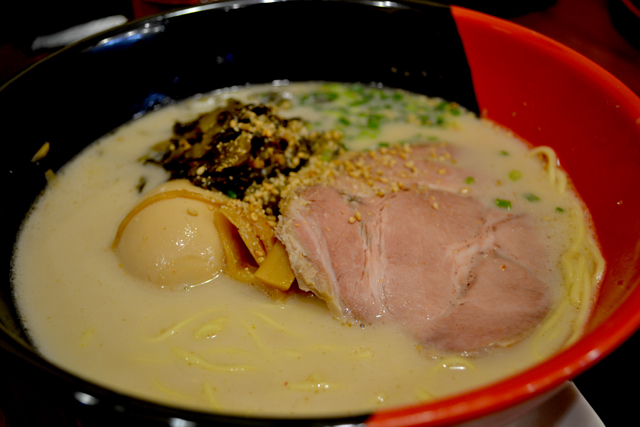
Ramen has always been big in Japan, and since the mid-2000's it has exponentially grown in popularity and trendiness, with younger entrepenuers trying their hand at making the nation's most beloved
B-kyu (B-Class) food.
B-kyu foods are defined as "comfort foods" like curry, ramen,
gyudon (beef bowl) and yakisoba. In contrast,
A-kyu (A-Class) foods are the countless kaiseki and Michelin-starred restaurants that populate Japan. It was as if people were tired of these A-kyu establishments and started to "elevate" B-kyu foods. And with food rating tools like
Tabelog and
GuruNavi (Gourmet Navigation) everyone became a critic where every place should be critiqued.
It was strange to come back to America in 2010 and find that the it had also started its love affair with ramen. But I think what's missing in American ramen is its inherent B-kyu-ness. With ramen bowls priced at over $10, ramen is no longer fast, slurp and go; and with the broth at lukewarm temperatures, it is also not a very sweaty sport. But with every import, there is a new application and I hope that we settle on a good one in the States.
I wanted to feel the B-kyu nostalgia during my stay this time in Japan and went to some
ekimae (near the station) ramen shops.
The first ramen shop we went to was one that Washi's boss recommended called Saikai Nagasaki Ramen.
 Saikai Nagasaki Ramen at Seiseki-sakuragaoka
Saikai Nagasaki Ramen at Seiseki-sakuragaoka
We were skeptical at just this recommendation, so we asked Washi's brother, a ramen and
tsukemen (dipping ramen) enthusiast, for the real skinny. "
Warukunai-yo," (it's not bad) was his response, which was better than we expected. So Washi, his dad and I went to this place at around 11:30am. The place was already packed and we came at the right time as a line formed behind us rather quickly.
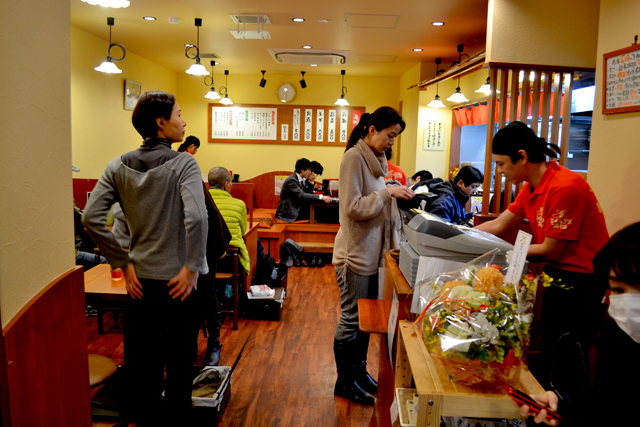
The menu was simple. There was the Saikai Ramen (House ramen; 480yen or about $5), Negi (Ramen with scallions; 580yen), Takana (Ramen with mustard greens; 500yen) and Kakuni (Ramen with stewed pork belly; 680yen) and Aburi Bara Toro Chashu (Ramen with fatty pork belly; 780 yen) with the option of getting regular or red pepper noodles. We all ordered the Takana ramen and I got the red pepper noodles.
The ramen arrived in minutes along with some regional cold tea. The broth is taken from fish so it wasn't very heavy, which was nice as the first meal of the day.
 Takana ramen with regular noodles
Takana ramen with regular noodles
Plenty of
menma (bamboo shoots) and a healthy dose of chashu made up for the light broth. I also really enjoyed the
takana for an added crunch and salt element. I had never had takana in my ramen and it was a pleasant discovery.
 Takana ramen with red pepper noodles
Takana ramen with red pepper noodles
The red pepper noodles didn't really add anything to my ramen. I tried the regular too and I think the red pepper noodles added a very slight spice to the overall bowl, but it was more noticeable with my eyes than tastebuds.
We were done in under 30 minutes and the bill was less than 2,000yen and we were ready to face the day.
A week later, I had another opportunity to bury my face in a bowl of ramen. I was to meet my sister at Shibuya Station and had a total of 20 minutes to spare. I knew that if I wanted ramen in Shibuya I should head out of the west Inokashira line exit toward Dogenzaka.
Ramen spots galore.
Miso-tonkotsu-shoyu ramen at Hikarihishio Ramen in Shibuya:
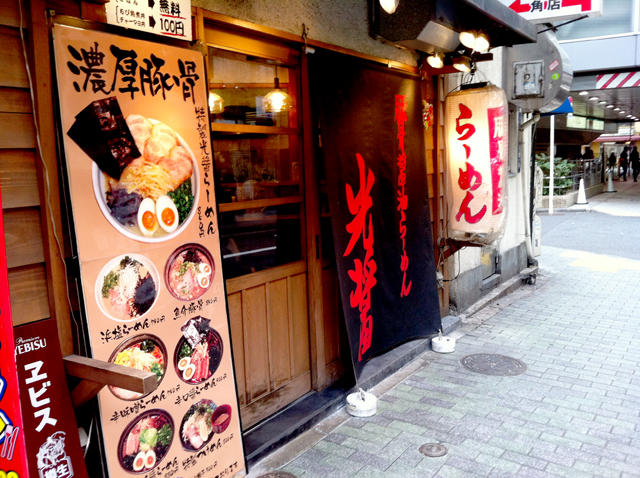 Hikarihishio Ramen. This looked pretty good, but I was turned off by the guy who was yelling in my ear to come in.
Hikarihishio Ramen. This looked pretty good, but I was turned off by the guy who was yelling in my ear to come in.
Probably some shoyu ramen here at an old-school looking joint Kouraku Honpo, and not old-school in a very good way.
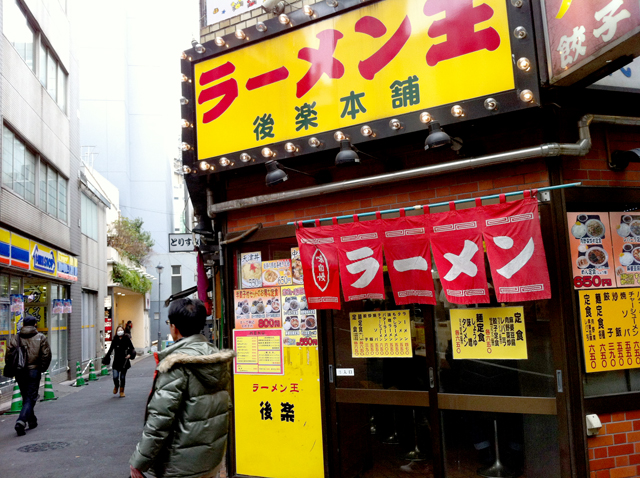 Kouraku Honpo
Kouraku Honpo
Bukotsu Gaiden Miso seemed to have a very popular tsukemen.
 Bukotsu Gaiden Miso Ramen. This seemed to be what was attracting the masses but a little too intense for me at the time which huge BBQ looking pork pieces.
Bukotsu Gaiden Miso Ramen. This seemed to be what was attracting the masses but a little too intense for me at the time which huge BBQ looking pork pieces.
Ramen Kindenmaru was another tonkotsu joint along the street.
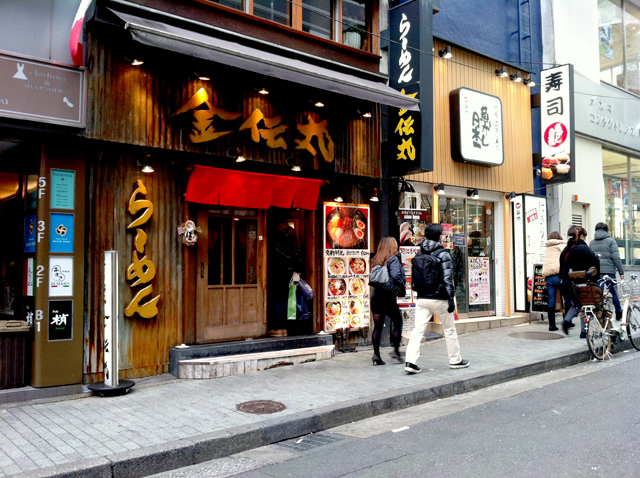 Ramen Kindenmaru
Ramen Kindenmaru
And yet another...

I chose this place Otoko Asahiyama because their
shio (salt) ramen looked good.
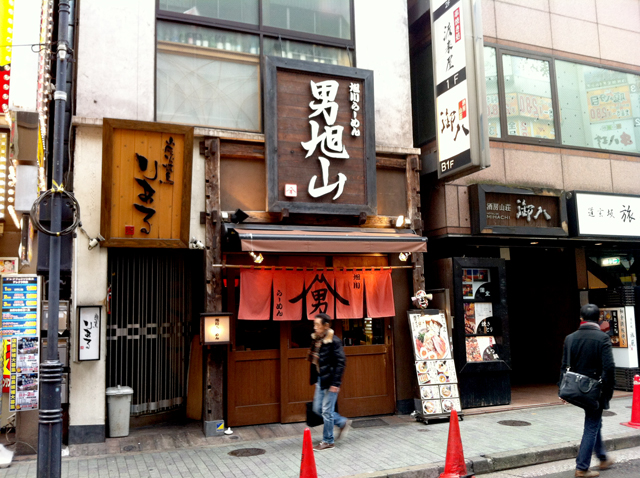

I walked in, made my transaction through the ticket machine and sat down next to a row of hurried salaryman. The tickets were placed on the counter and the one guy making the ramen busted out my bowl in about five minutes.
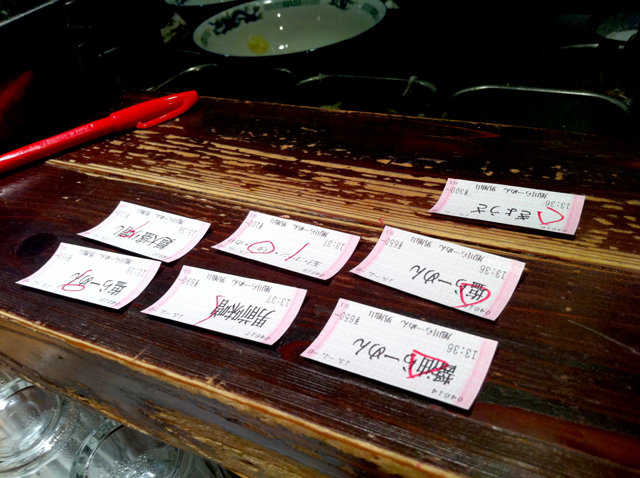 Tickets
Tickets
 One guy making ramen.
One guy making ramen.
The soup was so satisfying without being a gut-buster, although it was still slightly heavy from the tonkotsu, so I couldn't drink it all.
 Shio ramen at Otoko Asahiyama
Shio ramen at Otoko Asahiyama
The noodles were a little soft for my taste, but had a good springy consistency to it.
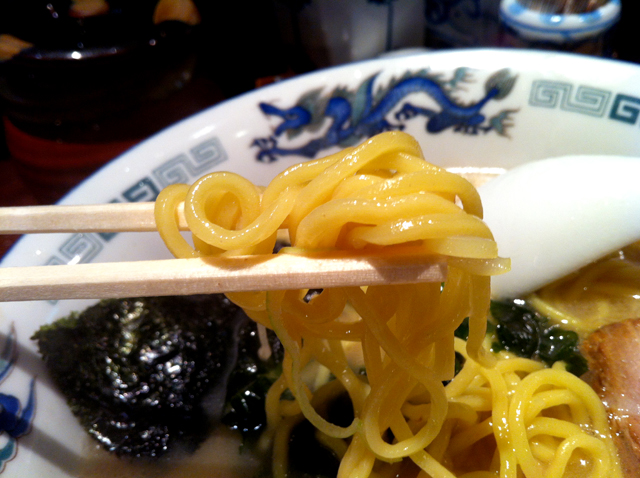
I was really into this
ramen kosho (ramen pepper) that gave the bowl a unique spicy kick.
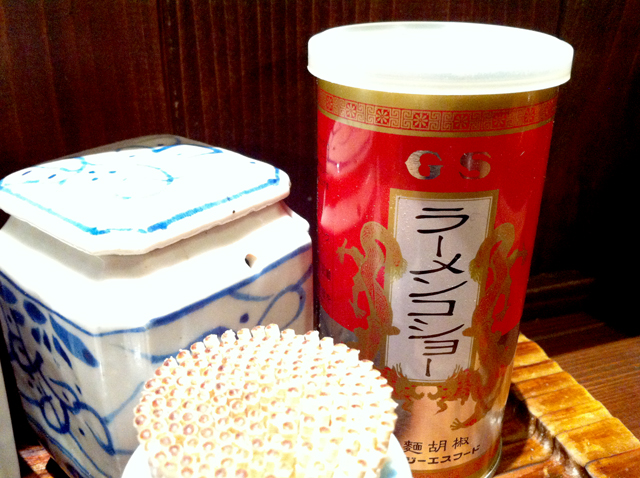
This was a very satisfying bowl of ramen overall and the spare surroundings were nice.
The best thing about B-kyu dining is that no one bothers you due to its highly organized system. It's all within reach: the water, the condiments, the utensils, etc. and because you've already paid in advance you don't even need to talk to anyone at the end. It's what the fast-food gods dream of.
I ate, used the bathroom and left -- all within 15 minutes, with plenty of time and energy to sprint across the station to meet my little sister. God, I love Japan.
Saikai Nagasaki Ramen
Higashi-koukashita
Seisekisakuragaoka Crown-gai
2-41-1 Sekido, Tama-shi, Tokyo
Otoko Asahiyama
Menaa Dogenzaka 1F
2-8-8 Dogenzaka
Shibuya-ku, Tokyo
 Ramen has always been big in Japan, and since the mid-2000's it has exponentially grown in popularity and trendiness, with younger entrepenuers trying their hand at making the nation's most beloved B-kyu (B-Class) food.
B-kyu foods are defined as "comfort foods" like curry, ramen, gyudon (beef bowl) and yakisoba. In contrast, A-kyu (A-Class) foods are the countless kaiseki and Michelin-starred restaurants that populate Japan. It was as if people were tired of these A-kyu establishments and started to "elevate" B-kyu foods. And with food rating tools like Tabelog and GuruNavi (Gourmet Navigation) everyone became a critic where every place should be critiqued.
It was strange to come back to America in 2010 and find that the it had also started its love affair with ramen. But I think what's missing in American ramen is its inherent B-kyu-ness. With ramen bowls priced at over $10, ramen is no longer fast, slurp and go; and with the broth at lukewarm temperatures, it is also not a very sweaty sport. But with every import, there is a new application and I hope that we settle on a good one in the States.
I wanted to feel the B-kyu nostalgia during my stay this time in Japan and went to some ekimae (near the station) ramen shops.
The first ramen shop we went to was one that Washi's boss recommended called Saikai Nagasaki Ramen.
Ramen has always been big in Japan, and since the mid-2000's it has exponentially grown in popularity and trendiness, with younger entrepenuers trying their hand at making the nation's most beloved B-kyu (B-Class) food.
B-kyu foods are defined as "comfort foods" like curry, ramen, gyudon (beef bowl) and yakisoba. In contrast, A-kyu (A-Class) foods are the countless kaiseki and Michelin-starred restaurants that populate Japan. It was as if people were tired of these A-kyu establishments and started to "elevate" B-kyu foods. And with food rating tools like Tabelog and GuruNavi (Gourmet Navigation) everyone became a critic where every place should be critiqued.
It was strange to come back to America in 2010 and find that the it had also started its love affair with ramen. But I think what's missing in American ramen is its inherent B-kyu-ness. With ramen bowls priced at over $10, ramen is no longer fast, slurp and go; and with the broth at lukewarm temperatures, it is also not a very sweaty sport. But with every import, there is a new application and I hope that we settle on a good one in the States.
I wanted to feel the B-kyu nostalgia during my stay this time in Japan and went to some ekimae (near the station) ramen shops.
The first ramen shop we went to was one that Washi's boss recommended called Saikai Nagasaki Ramen.
 Saikai Nagasaki Ramen at Seiseki-sakuragaoka
We were skeptical at just this recommendation, so we asked Washi's brother, a ramen and tsukemen (dipping ramen) enthusiast, for the real skinny. "Warukunai-yo," (it's not bad) was his response, which was better than we expected. So Washi, his dad and I went to this place at around 11:30am. The place was already packed and we came at the right time as a line formed behind us rather quickly.
Saikai Nagasaki Ramen at Seiseki-sakuragaoka
We were skeptical at just this recommendation, so we asked Washi's brother, a ramen and tsukemen (dipping ramen) enthusiast, for the real skinny. "Warukunai-yo," (it's not bad) was his response, which was better than we expected. So Washi, his dad and I went to this place at around 11:30am. The place was already packed and we came at the right time as a line formed behind us rather quickly.
 The menu was simple. There was the Saikai Ramen (House ramen; 480yen or about $5), Negi (Ramen with scallions; 580yen), Takana (Ramen with mustard greens; 500yen) and Kakuni (Ramen with stewed pork belly; 680yen) and Aburi Bara Toro Chashu (Ramen with fatty pork belly; 780 yen) with the option of getting regular or red pepper noodles. We all ordered the Takana ramen and I got the red pepper noodles.
The ramen arrived in minutes along with some regional cold tea. The broth is taken from fish so it wasn't very heavy, which was nice as the first meal of the day.
The menu was simple. There was the Saikai Ramen (House ramen; 480yen or about $5), Negi (Ramen with scallions; 580yen), Takana (Ramen with mustard greens; 500yen) and Kakuni (Ramen with stewed pork belly; 680yen) and Aburi Bara Toro Chashu (Ramen with fatty pork belly; 780 yen) with the option of getting regular or red pepper noodles. We all ordered the Takana ramen and I got the red pepper noodles.
The ramen arrived in minutes along with some regional cold tea. The broth is taken from fish so it wasn't very heavy, which was nice as the first meal of the day.
 Takana ramen with regular noodles
Plenty of menma (bamboo shoots) and a healthy dose of chashu made up for the light broth. I also really enjoyed the takana for an added crunch and salt element. I had never had takana in my ramen and it was a pleasant discovery.
Takana ramen with regular noodles
Plenty of menma (bamboo shoots) and a healthy dose of chashu made up for the light broth. I also really enjoyed the takana for an added crunch and salt element. I had never had takana in my ramen and it was a pleasant discovery.
 Takana ramen with red pepper noodles
The red pepper noodles didn't really add anything to my ramen. I tried the regular too and I think the red pepper noodles added a very slight spice to the overall bowl, but it was more noticeable with my eyes than tastebuds.
We were done in under 30 minutes and the bill was less than 2,000yen and we were ready to face the day.
A week later, I had another opportunity to bury my face in a bowl of ramen. I was to meet my sister at Shibuya Station and had a total of 20 minutes to spare. I knew that if I wanted ramen in Shibuya I should head out of the west Inokashira line exit toward Dogenzaka.
Ramen spots galore.
Miso-tonkotsu-shoyu ramen at Hikarihishio Ramen in Shibuya:
Takana ramen with red pepper noodles
The red pepper noodles didn't really add anything to my ramen. I tried the regular too and I think the red pepper noodles added a very slight spice to the overall bowl, but it was more noticeable with my eyes than tastebuds.
We were done in under 30 minutes and the bill was less than 2,000yen and we were ready to face the day.
A week later, I had another opportunity to bury my face in a bowl of ramen. I was to meet my sister at Shibuya Station and had a total of 20 minutes to spare. I knew that if I wanted ramen in Shibuya I should head out of the west Inokashira line exit toward Dogenzaka.
Ramen spots galore.
Miso-tonkotsu-shoyu ramen at Hikarihishio Ramen in Shibuya:
 Hikarihishio Ramen. This looked pretty good, but I was turned off by the guy who was yelling in my ear to come in.
Probably some shoyu ramen here at an old-school looking joint Kouraku Honpo, and not old-school in a very good way.
Hikarihishio Ramen. This looked pretty good, but I was turned off by the guy who was yelling in my ear to come in.
Probably some shoyu ramen here at an old-school looking joint Kouraku Honpo, and not old-school in a very good way.
 Kouraku Honpo
Bukotsu Gaiden Miso seemed to have a very popular tsukemen.
Kouraku Honpo
Bukotsu Gaiden Miso seemed to have a very popular tsukemen.
 Bukotsu Gaiden Miso Ramen. This seemed to be what was attracting the masses but a little too intense for me at the time which huge BBQ looking pork pieces.
Ramen Kindenmaru was another tonkotsu joint along the street.
Bukotsu Gaiden Miso Ramen. This seemed to be what was attracting the masses but a little too intense for me at the time which huge BBQ looking pork pieces.
Ramen Kindenmaru was another tonkotsu joint along the street.
 Ramen Kindenmaru
And yet another...
Ramen Kindenmaru
And yet another...
 I chose this place Otoko Asahiyama because their shio (salt) ramen looked good.
I chose this place Otoko Asahiyama because their shio (salt) ramen looked good.

 I walked in, made my transaction through the ticket machine and sat down next to a row of hurried salaryman. The tickets were placed on the counter and the one guy making the ramen busted out my bowl in about five minutes.
I walked in, made my transaction through the ticket machine and sat down next to a row of hurried salaryman. The tickets were placed on the counter and the one guy making the ramen busted out my bowl in about five minutes.
 Tickets
Tickets
 One guy making ramen.
The soup was so satisfying without being a gut-buster, although it was still slightly heavy from the tonkotsu, so I couldn't drink it all.
One guy making ramen.
The soup was so satisfying without being a gut-buster, although it was still slightly heavy from the tonkotsu, so I couldn't drink it all.
 Shio ramen at Otoko Asahiyama
The noodles were a little soft for my taste, but had a good springy consistency to it.
Shio ramen at Otoko Asahiyama
The noodles were a little soft for my taste, but had a good springy consistency to it.
 I was really into this ramen kosho (ramen pepper) that gave the bowl a unique spicy kick.
I was really into this ramen kosho (ramen pepper) that gave the bowl a unique spicy kick.
 This was a very satisfying bowl of ramen overall and the spare surroundings were nice.
The best thing about B-kyu dining is that no one bothers you due to its highly organized system. It's all within reach: the water, the condiments, the utensils, etc. and because you've already paid in advance you don't even need to talk to anyone at the end. It's what the fast-food gods dream of.
I ate, used the bathroom and left -- all within 15 minutes, with plenty of time and energy to sprint across the station to meet my little sister. God, I love Japan.
Saikai Nagasaki Ramen
Higashi-koukashita
Seisekisakuragaoka Crown-gai
2-41-1 Sekido, Tama-shi, Tokyo
Otoko Asahiyama
Menaa Dogenzaka 1F
2-8-8 Dogenzaka
Shibuya-ku, Tokyo
This was a very satisfying bowl of ramen overall and the spare surroundings were nice.
The best thing about B-kyu dining is that no one bothers you due to its highly organized system. It's all within reach: the water, the condiments, the utensils, etc. and because you've already paid in advance you don't even need to talk to anyone at the end. It's what the fast-food gods dream of.
I ate, used the bathroom and left -- all within 15 minutes, with plenty of time and energy to sprint across the station to meet my little sister. God, I love Japan.
Saikai Nagasaki Ramen
Higashi-koukashita
Seisekisakuragaoka Crown-gai
2-41-1 Sekido, Tama-shi, Tokyo
Otoko Asahiyama
Menaa Dogenzaka 1F
2-8-8 Dogenzaka
Shibuya-ku, Tokyo


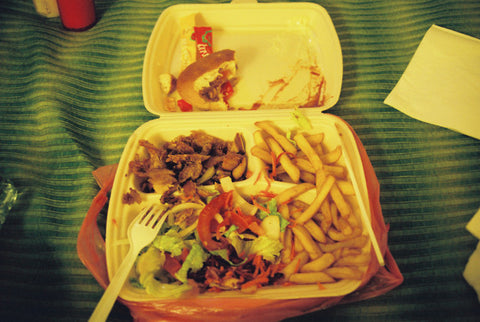
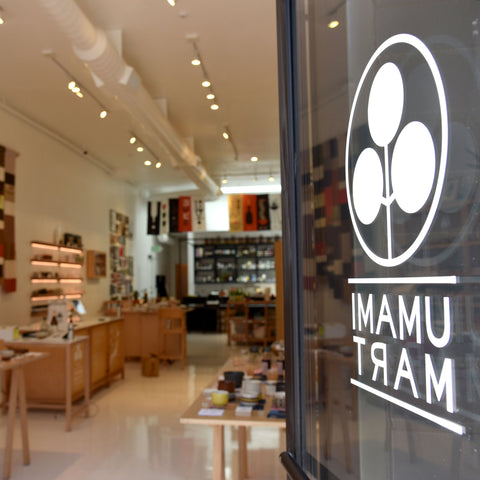
Comments (5)
Nice post. I have a hard time explaining B-kyu gurume to my friends. Japanese has an obsession classifying and naming things, but it’s basically soul food. I agree with the price of ramen here, but I guess the ingredients to make an authentic tasting bowl can add up. I love the casualness of pho joints in that way and wish I can re-experience the same with ramen.
You forget how cheap ramen is in Japan. Even in London, a bowl will set you back a good £10.
Thanks Dennis. Yes, “soul food” or “comfort food” is a fitting explanation of B-kyu gurume. Yes! I would love to enjoy ramen here the way I enjoy pho in the South Bay (San Jose Area).
Sakura – yes, it’s like paying almost $20 for a burrito in Tokyo. It just kind of changes the whole experience and “charm” of eating a burrito.
This is awesome! Surprisingly I’ve never heard of B-kyu before. Great info.
Can’t wait to go back… I’ve explored Shibuya quite a bit but never tried a shop there.
One day I will finally be able to visit Japan and I will pig out like never before. They truly have the most amazing food!